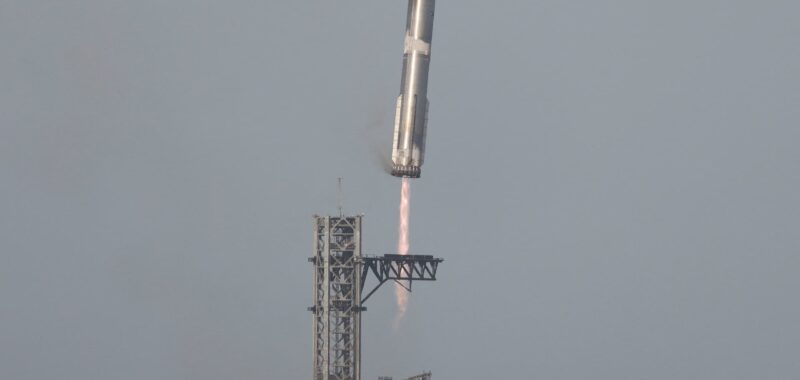SpaceX has been granted permission by the Federal Aviation Administration to launch and land its massive Starship rockets and Super Heavy boosters up to 25 times per year from the company’s Starbase spaceport in Texas.
The aerospace and defense contractor run by Elon Musk was previously restricted to five Starship launches per year from the site. While SpaceX submitted the proposal to increase its launch cadence on the Texas Gulf Coast during the Biden administration, a final environmental assessment was just announced on Tuesday, more than three months into President Donald Trump’s term.
Musk has been a central figure in President Trump’s second administration, leading an effort to shrink the federal government and regulatory agencies, including those that oversee his companies.
The decision that the FAA announced on Tuesday is one piece of the agency’s license review process for launches.
“There are other licensing requirements still to be completed,” the FAA said in an emailed statement, with ongoing reviews that pertain to “policy, payload, safety, financial responsibility and environmental impacts.”
“Once the evaluation process is complete, the FAA will make a determination to approve or deny the license application,” the agency said.
In its final environmental assessment, the FAA decided that SpaceX’s proposal for more launches from Boca Chica, Texas, would have “no significant impact” to the environment in the vicinity. The determination follows a string of SpaceX Starship test flights and explosions, and legal clashes between the company, environmental groups and the FAA.

SpaceX originally designed its Starship rockets with the goal of launching cargo, and as many as 100 people at a time, to space. Musk has long promised SpaceX would conduct manned missions to Mars in the near future with Starship, though a realistic timeline for his goal remains elusive.
SpaceX’s first integrated Starship vehicle launched from the Boca Chica facility in April 2023, and exploded mid-flight. The U.S. Fish and Wildlife Service soon disclosed details about the aftermath of that explosion, including that a “3.5-acre fire started south of the pad site on Boca Chica State Park land,” following the test flight. Fire and debris destroyed nests, eggs and fragile habitat of endangered species in the area, the New York Times reported.
The next month, the Center for Biological Diversity and other environmental advocates, sued the FAA over purportedly inadequate environmental reviews before granting SpaceX permission to conduct those launches.
By August 2024, Texas state and federal environmental regulators had fined SpaceX after determining the company had violated the Clean Water Act at Starbase, repeatedly polluting waters in the area. Musk then threatened to sue the FAA for “regulatory overreach” when the agency said it would levy fines against SpaceX after alleged licensing and safety-related violations during two other launches in 2023.
Musk didn’t sue, however. Instead, he spent almost $300 million to propel Trump back to the White House.
A senior attorney with the Center for Biological Diversity, Jared Margolis, said in an email to CNBC on Tuesday, that his group was “incredibly disappointed, though not surprised, that the FAA has allowed SpaceX to drastically increase the number of launches and the associated harm to an ecologically critical area without taking the time to fully analyze and mitigate the impacts to the community and wildlife.”
A SpaceX spokesperson didn’t respond to a request for comment.
The decision by the FAA comes days after SpaceX won an election over the weekend to incorporate Starbase as its own city. The mayor and two city commissioners both come from SpaceX’s employee ranks.
WATCH: SpaceX scrubs launch of mission to replace stranded astronauts


